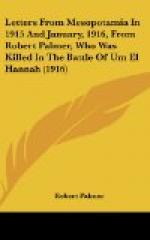The men sleep in huts just behind. These are sensibly built of brick. Only the S. side is walled up, and even there a space is left between the wall and the ceiling. The rest is just fenced with reed trellis work. The roofs are of reed matting, the floors brick with floor-boards for sleeping on. Boards and bedding are put out in the sun by day. The men are very contented in them. If I ask my men how they like it compared to India, they all say they like it better. “Why, you gets a decent dinner here, Sir.” My experience quite confirms that of Sir Redvers Buller and other great authorities. If you feed T.A. well you can put him in slimy trenches and he’ll be perfectly happy: but he’d never be contented in Buckingham Palace on Indian rations. Here we are of course on war rations, cheese, bacon and jam, bully beef and quite decent mutton, and condensed milk. Vegetables are scarce, so lime juice is an issue: and they are said just to have made beer one, which would be the crown of bliss. Every man gets (if he’s there) five grains of quinine a day. There are, however, far fewer mosquitoes than I expected. I’ve only seen one myself. The only great pest is flies: but even of those there are far fewer here than in Basra.
When I hear what the 1/4th have been through, I think we are in luxury. They had a very rough trek to Ahway and Illah in Persia in May, and coming back much exhausted were stationed a month in Ashar Barracks (Basra). Here for a fortnight it never went below 100 deg. by night and was 115 deg. by day—damp heat: and the barracks (Turkish) were in a state which precluded rest: the record bag for one man in one morning was sixty fleas from his puttees alone. And of course what Austen told the H. of C. about fans, ice and fruit was all eyewash.
* * * * *
A man in our Coy. died last night. I’d never seen him or knew he was ill. I was rather shocked at the way nobody seemed to care a bit. The Adjt. just looked in and said “who owns Pte. Taylor A.” Harris said “I do: is he dead?” Adjt. “Yes: you must bury him to-morrow.” Harris: “Right o.” Exit Adjt. To do Harris justice, he doesn’t know the man and thought he was still at Nasiriyah. None of the man’s old Coy. officers are here.
* * * * *
AMARAH.
September 21, 1915.
TO HIS MOTHER.
The provision for the sick and wounded is on the whole fairly good now. Six months ago it was very inadequate, too few doctors and not enough hospital accommodation. My men who were in the Base Hospital at Basra spoke very well of it: it had 500 men in it then, and is capable of indefinite expansion. The serious cases are invalided to India by the hospital ship Madras. It is said that 10,000 have gone back to India in this way. It is a curious fact that the Indian troops suffered from heat-stroke every bit as much as the British.




